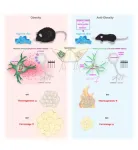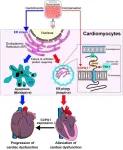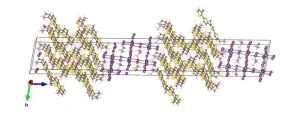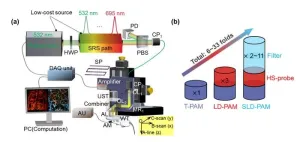(Press-News.org) Rutgers-led research found that marine heat waves – prolonged periods of unusually warm ocean temperatures – haven’t had a lasting effect on the fish communities that feed most of the world.
The finding is in stark contrast to the devastating effects seen on other marine ecosystems cataloged by scientists after similar periods of warming, including widespread coral bleaching and harmful algal blooms.
“There is an emerging sense that the oceans do have some resilience, and while they are changing in response to climate change, we don’t see evidence that marine heat waves are wiping out fisheries,” said Alexa Fredston, the lead author of the study who conducted the research as a postdoctoral associate in the Global Change Research Group, part of the Department of Ecology, Evolution and Natural Resources in the Rutgers School of Environmental and Biological Sciences (SEBS.)
The study, published in Nature, assessed effects on commercially important fish such as flounder, pollock and rockfish based on data extracted from long-running scientific trawl surveys – conducted by towing a net along the seafloor – of continental shelf ecosystems in North America and Europe between 1993 and 2019. The analysis included 248 marine heat waves with extreme sea bottom temperatures during this period. The researchers were surprised to find that marine heat waves in general don’t show major adverse effects on regional fish communities.
Although declines in biomass did occur after some marine heat waves, the researchers said these cases were the exception, not the rule. Overall, they found that the effects of marine heat waves aren’t distinguishable from the natural variability in these ecosystems.
“The oceans are highly variable, and fish populations vary quite a lot,” said Fredston, now an assistant professor of ocean sciences at University of California, Santa Cruz. “Marine heat waves can drive local change, but there have been hundreds of marine heat waves with no lasting impacts.”
In addition to assessing the impact on the total quantity of organisms in a given area, known as biomass, the researchers examined whether marine heat waves were causing changes in the variety of fish species composing fish communities. For example, evidence might show the loss of species associated with cold water and an increase in species associated with warm water, a phenomenon known as tropicalization.
The findings suggest fish may be able to find safe havens by moving to areas with cooler water during marine heat waves, which the researchers defined as periods of more than five days with extreme sea bottom temperatures for that region and season.
The data included some notable examples of marine heat waves that did have profound impacts, such as the 2014-2016 marine heat wave in the Northeast Pacific known as “the Blob,” one of the largest on record.
While “the Blob” led to a 22 percent loss of biomass in the Gulf of Alaska, a 2012 marine heat wave in the Northwest Atlantic led to a 70 percent biomass gain. The authors also noted that these weren’t large changes compared to natural variability in biomass, and similar effects weren’t seen after most other marine heat waves.
“We found that these negative impacts are unpredictable and that other heat waves had no strong impacts,” said Malin Pinsky, an associate professor in the Department of Ecology, Evolution and Natural Resources and director of the Global Change Research Group at SEBS and a co-author of the study. “This means that each heat wave that hits is like rolling the dice: Will it be a bad one or not? We don't know until it happens.”
Other Rutgers researchers who participated in the study include Zoë Kitchel, a doctoral student, and Aurore Maureaud, a postdoctoral associate, both with the Department of Ecology, Evolution and Natural Resources at SEBS.
Researchers from other institutions participated in the study, including the University of British Columbia, the University of Bern in Switzerland, the National Oceanic and Atmospheric Administration, the French Research Institute for Exploitation of the Sea, the University of Montpellier in France, the University of Tromsø in Norway and Fisheries and Oceans Canada.
END
Coastal fisheries show surprising resilience to marine heat waves
Rutgers-led study finds that in the years following marine heat waves, effects on fish communities were often minimal
2023-08-31
ELSE PRESS RELEASES FROM THIS DATE:
A new breakthrough in obesity research allows you to lose fat while eating all you want
2023-08-31
This is a significant development that brings hope to the one billion individuals with obesity worldwide. Researchers led by Director C. Justin LEE from the Center for Cognition and Sociality (CCS) within the Institute for Basic Science (IBS) have discovered new insights into the regulation of fat metabolism. The focus of their study lies within the star-shaped non-neuronal cells in the brain, known as 'astrocytes'. Furthermore, the group announced successful animal experiments using the newly developed drug 'KDS2010', which allowed the mice to successfully achieve weight loss without resorting ...
New blood test for noncoding RNA significantly improves cancer detection
2023-08-31
Cancer is most treatable in its early stages, so finding innovative and non-invasive methods to diagnose cancer early on is crucial for fighting the disease. Liquid biopsies, which require just a simple blood draw, are an emerging technology for non-invasively testing for cancer using DNA or RNA sequencing of a patient’s blood.
Assistant Professor of Biomolecular Engineering Daniel Kim and his lab are developing more accurate and powerful liquid biopsy technologies that take advantage of signals from RNA “dark matter,” an understudied ...
Largest genetic study of epilepsy to date provides new insights on why epilepsy develops and potential treatments
2023-08-31
Thursday, 31 August 2023: The largest genetic study of its kind, coordinated by the International League Against Epilepsy, including scientists from FutureNeuro at RCSI University of Medicine and Health Sciences, has discovered specific changes in our DNA that increase the risk of developing epilepsy.
The research, published today in Nature Genetics, greatly advances our knowledge of why epilepsy develops and may inform the development of new treatments for the condition.
Epilepsy, a common brain disorder of which there are many different types, is known to have genetic component and to sometimes run in families. Here, researchers compared the DNA from diverse groups of almost ...
Intracellular recycling: the key to surviving potent anti-cancer drugs
2023-08-31
Researchers from Tokyo Medical and Dental University(TMDU) determine how cardiomyocytes protect themselves against anti-cancer medication
Tokyo, Japan – A cell contains many specialized subunits, called organelles, that carry out important tasks such as energy generation, protein synthesis, and calcium outflux. But what happens when something goes wrong with one of the organelles?
In a study recently published in the Journal of the American College of Cardiology: CardioOncology, researchers from Tokyo Medical and Dental University(TMDU) have ...
Growing triple-decker hybrid crystals for lasers
2023-08-31
By controlling the arrangement of multiple inorganic and organic layers within crystals using a novel technique, researchers at Duke University and Purdue University have shown they can control the energy levels of electrons and holes (positive charge carriers) within a class of materials called perovskites. This tuning influences the materials’ optoelectronic properties and their ability to emit light of specific energies, demonstrated by their ability to function as a source of lasers.
Appearing online August 31 in the journal Nature Chemistry, the research is the result of a close collaboration between several ...
Positive framing of genomics met with scepticism in some communities
2023-08-31
August 31, 2023 - New research published today in Human Genetics and Genomics Advances reveals the difference between ‘what we say’ and ‘what people hear’ when engaging underrepresented communities around genomics and healthcare.
Genomics datasets, which underpin the ability to interpret all genetic tests, are known to consist of DNA from predominately white, Northern European populations. As genomics becomes an increasingly important part of everyday healthcare*, barriers to diverse participation must be overcome so that everyone can benefit from genomic medicine, not just the privileged few.
The research ...
People who are in good shape take fewer mental-health related medication
2023-08-31
“We find that people who are in better shape fill fewer prescriptions for anxiety and depression medications,” says Linda Ernstsen, the senior author of the article and an associate professor from the Department of Public Health and Nursing at the Norwegian University of Science and Technology (NTNU).
The research group based its work on the Trøndelag Health Study (HUNT). Since 1984, 250,000 Trøndelag residents have voluntarily contributed their health data to this comprehensive ...
Breathe! The shape-shifting ball that supports mental health
2023-08-31
A soft ball that ‘personifies’ breath, expanding and contracting in synchronicity with a person’s inhalations and exhalations, has been invented by a PhD student at the University of Bath in the UK. The ball is designed to support mental health, giving users a tangible representation of their breath to keep them focused and to help them regulate their emotions.
Alexz Farrall, the student in the Department of Computer Science who invented the device, said: "By giving breath physical form, the ball enhances self-awareness and engagement, fostering positive mental health outcomes."
Generally, ...
Out with the old, in with the new: Agile mentorship to support future scientists
2023-08-31
INDIANAPOLIS – Mentorship has existed throughout history. Socrates mentored Plato, who, in turn, mentored Aristotle. Humphry Davy, the chemist who was the first to isolate potassium, sodium and at least five other elements, mentored Michael Faraday, inventor of the world’s first electric generator. Sigmund Freud mentored Carl Jung. Science teacher Elizabeth Mommaerts mentored Sally Ride. Maya Angelou mentored Oprah Winfrey. The list of knowledge bearers and knowledge seekers who have connected meaningfully goes ...
CityU researchers develop ultra-sensitive photoacoustic microscopy for wide biomedical application potential
2023-08-31
Optical-resolution photoacoustic microscopy is an up-and-coming biomedical imaging technique for studying a broad range of diseases, such as cancer, diabetes and stroke. But its insufficient sensitivity has been a longstanding obstacle for its wider application. Recently, a research team from City University of Hong Kong (CityU) developed a multi-spectral, super-low-dose photoacoustic microscopy system with a significant improvement in the system sensitivity limit, enabling new biomedical applications and clinical translation in the future.
Photoacoustic ...
LAST 30 PRESS RELEASES:
Study: Discontinuing antidepressants in pregnancy nearly doubles risk of mental health emergencies
Bipartisan members of congress relaunch Congressional Peripheral Artery Disease (PAD) Caucus with event that brings together lawmakers, medical experts, and patient advocates to address critical gap i
Antibody-drug conjugate achieves high response rates as frontline treatment in aggressive, rare blood cancer
Retina-inspired cascaded van der Waals heterostructures for photoelectric-ion neuromorphic computing
Seashells and coconut char: A coastal recipe for super-compost
Feeding biochar to cattle may help lock carbon in soil and cut agricultural emissions
Researchers identify best strategies to cut air pollution and improve fertilizer quality during composting
International research team solves mystery behind rare clotting after adenoviral vaccines or natural adenovirus infection
The most common causes of maternal death may surprise you
A new roadmap spotlights aging as key to advancing research in Parkinson’s disease
Research alert: Airborne toxins trigger a unique form of chronic sinus disease in veterans
University of Houston professor elected to National Academy of Engineering
UVM develops new framework to transform national flood prediction
Study pairs key air pollutants with home addresses to track progression of lost mobility through disability
Keeping your mind active throughout life associated with lower Alzheimer’s risk
TBI of any severity associated with greater chance of work disability
Seabird poop could have been used to fertilize Peru's Chincha Valley by at least 1250 CE, potentially facilitating the expansion of its pre-Inca society
Resilience profiles during adversity predict psychological outcomes
AI and brain control: A new system identifies animal behavior and instantly shuts down the neurons responsible
Suicide hotline calls increase with rising nighttime temperatures
What honey bee brain chemistry tells us about human learning
Common anti-seizure drug prevents Alzheimer’s plaques from forming
Twilight fish study reveals unique hybrid eye cells
Could light-powered computers reduce AI’s energy use?
Rebuilding trust in global climate mitigation scenarios
Skeleton ‘gatekeeper’ lining brain cells could guard against Alzheimer’s
HPV cancer vaccine slows tumor growth, extends survival in preclinical model
How blood biomarkers can predict trauma patient recovery days in advance
People from low-income communities smoke more, are more addicted and are less likely to quit
No association between mRNA COVID-19 vaccination during pregnancy and autism in children, new research shows
[Press-News.org] Coastal fisheries show surprising resilience to marine heat wavesRutgers-led study finds that in the years following marine heat waves, effects on fish communities were often minimal





